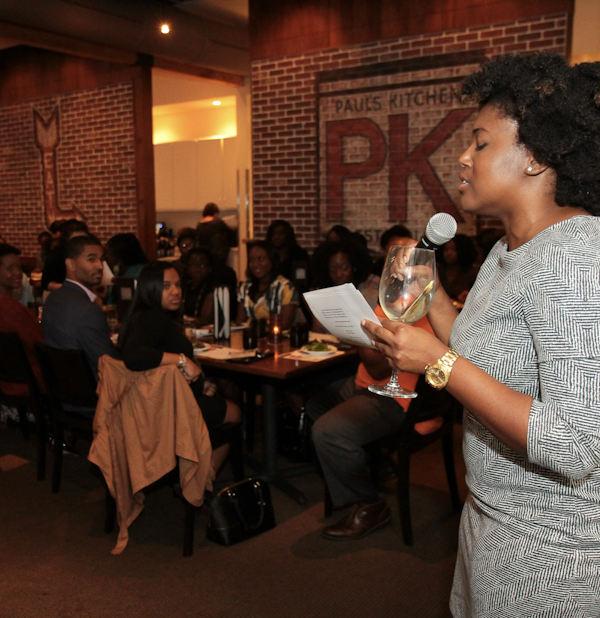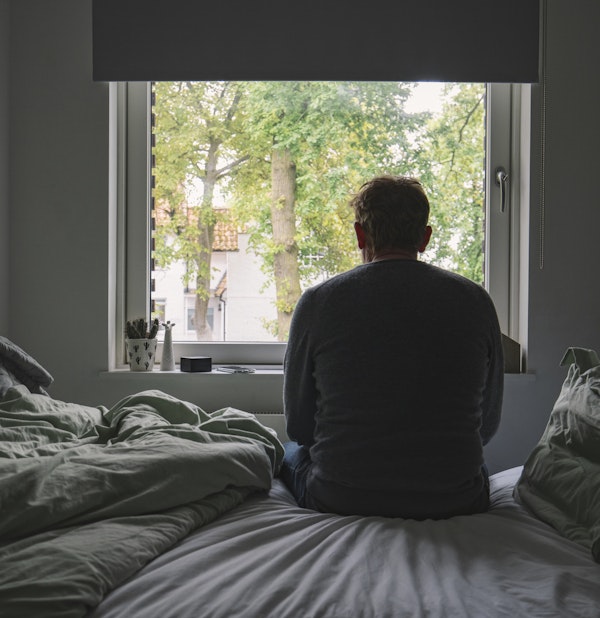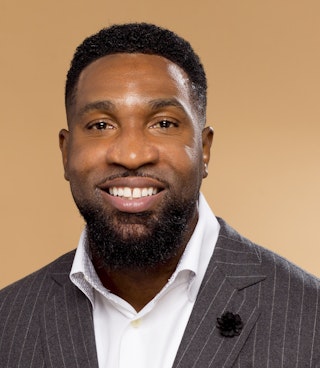Building bridges in the Divided States of America
How familial connections can combat polarization
 Keita Hopton speaking at a Family Dinner Foundation event in Houston, TX on Nov. 7, 2015. (Charles Brantley / Family Dinner Foundation)
Keita Hopton speaking at a Family Dinner Foundation event in Houston, TX on Nov. 7, 2015. (Charles Brantley / Family Dinner Foundation)
Keita Hopton found herself in a place she hadn’t chosen in the fall of 2013, carrying her life in trash bags, grieving the death of her mother, and abandoned by her family. She had just started a new job in Houston, but, emotionally, she was done.
“Imagine losing the most important person in your life and moving 900 miles away to a city you’ve never been. That was me,” she remembers. “I had already decided I was moving back to St. Louis. I couldn’t keep living such a lonely life.”
That’s when she heard about Our Family Dinner (now known as the Family Dinner Foundation). Twice. The first time, she ignored it. The second time, something nudged her to try it. “I remember praying and asking God to let me leave with at least one friend.” Before the dinner, she received a phone call checking in on her. When she arrived, she was greeted with hugs and smiles. And something shifted. “I met people who were just like me,” she says, “looking for a family in a place where they were alone. We ate and laughed, and it didn’t feel like strangers. It felt like home.” Before the night was over, she found me and said something I’ll never forget: “Family Dinner saved my life.”
Keita’s story isn’t just about personal transformation. It’s about the kind of connection that can heal a divided nation.
 The perils of isolation. (Justin Paget / Getty Images)
The perils of isolation. (Justin Paget / Getty Images)
When isolation fuels division
Did you know that one in four Americans goes an entire day without speaking to another human being face-to-face? According to the American Time Use Survey, this stark reality defines modern American life: no eye contact, no conversation, no handshakes, hugs, or hands held. What impact do you think this has on a human being? Neuroscientists say that even 24 hours without human contact triggers responses similar to solitary confinement: elevated cortisol, disrupted sleep, and impaired cognition. Over time, this level of disconnection literally shrinks your brain, and your ability to empathize degrades.
It gets worse. A study by Brigham Young University found that chronic loneliness increases your risk of early death by nearly 30%, the health equivalent of smoking 15 cigarettes a day. The Centers for Disease Control and Prevention confirm that loneliness contributes to heart disease, stroke, dementia, anxiety, and suicide. More than 75 million Americans live with this level of isolation. What impact do you think this has on our society?
Isolation doesn’t just harm individuals, it undermines the character and fabric of our country. We don’t just become less healthy; we become less human. We become less trusting, less communal, less willing to engage across difference, less capable of the empathy a pluralistic society requires. And our fractured politics, institutions, and unhealthy online discourse reveal the cost: Isolation has made us strangers to one another, and strangers are easier to demonize than neighbors.
In our digital age of smartphones and social media, this disconnection is easy to disguise because we’re all seemingly “connected.” But we’ve confused what our phones can do with what our human souls must do – be seen, known and cared for in the ways for which human beings were made. Without shared real-life experiences across lines of difference, political opponents transform from fellow citizens into sworn enemies. The very pluralism that makes America strong withers when we live as isolated individuals rather than interconnected community members.
I’ve seen both sides of this problem. Facebook was launched on my campus by my Harvard classmate, Mark Zuckerberg, so I was a not-so-far-removed witness to the social media revolution. But from a young age, I was also raised in a home where hospitality wasn’t just a value; it was a way of life. My parents immigrated to the United States from Nigeria in the 1970s with no blood relatives. They had lost parents to war and early death and they arrived in Piscataway, N.J., determined to rebuild a family from scratch.
So we waved to neighbors. We made our cookouts open invitation. Our dinner table became our front line of community. We and our neighbors didn’t just share keys, we shared burdens, birthdays, and hope. We shared our humanity. The Adjahs. The Forestiers. The O’Connors. The Ortizes. The Frimpongs. What I witnessed among these families wasn’t just hospitality, it was pluralism in action. We had different backgrounds, different stories, different beliefs, but we all gathered around one table. These relationships didn’t erase our differences; they made our differences a source of strength. That early experience has shaped my life’s work. In fact, it became the seed of the Family Dinner Foundation.
 The perils of isolation. (Justin Paget / Getty Images)
The perils of isolation. (Justin Paget / Getty Images)
A mission beyond the table
Our mission is simple: to connect the world as a family, at and beyond the dinner table. From the beginning, our citywide dinners weren’t networking events. They were nights for people who had no one in town, no one to call in a crisis, no one to hug on their birthday – and everyone left feeling like they belonged.
We’ve now hosted dinners in 30-plus cities across three continents, serving nearly 50,000 people. We’ve partnered with major brands and institutions, from the AARP to Ford and others. But eventually, we hit a wall. In New York City alone, we had over 15,000 members. Our largest partner venue sat 450. We couldn’t keep up, even if we only did dinners for new members for three years. At first, it felt like failure. But in time, we saw it for what it was: a blessing. Because it forced us to ask: What happens after dinner?
That question led to what we call our 5C Mutual Care Framework. The five Cs are commitment, connection, communication, crisis, and celebration. They all come together in the form of small groups of five people who meet over 12 weeks, during which they pledge to talk weekly and show up to biweekly meetings. If someone experiences a crisis – the loss of loved one, a job, poor health, etc. – or has a milestone celebration – promotion, the birth of a child, healing, sobriety, etc. – they promise to reach out to that individual with a call within 24 hours and a collective act of care within three days.
We piloted this model during the pandemic with over 100 groups. It was transformative. And nearly all 500 or so participants said their sense of belonging and well-being had meaningfully improved. One member said, “I lost my job on a Tuesday. By Wednesday, my group had a meal train going and grocery money in my Venmo.” Another reported, “I hadn’t celebrated my birthday in years. They showed up with a cake. I cried like a baby. Then I ate the entire cake like an adult.”
When you commit to showing up for someone’s crisis or celebration, political affiliation becomes secondary to human connection. The 5C model is now being explored for integration into first-year programming at several universities, with Stanford among the first to pilot this approach.
 Participants at a Family Dinner at City Hall the Restaurant in Miami, FL on March 8, 2014. (Omar Colom / Family Dinner Foundation)
Participants at a Family Dinner at City Hall the Restaurant in Miami, FL on March 8, 2014. (Omar Colom / Family Dinner Foundation)
A culturewide opportunity
The second blessing to come from the runaway success of our early dinners was even more important: It showed us that the loneliness epidemic was bigger than us. Loneliness isn’t an individual crisis, it’s a cultural one. And if we want to solve it, we’ll need everyone.
City leaders. Religious figures. Teachers. Developers. Business leaders. Tech leaders. Policymakers. Each one holds a piece of the solution. And that’s where the real opportunity lies, not just to solve the crisis, but to heal our culture.
In September, we’re launching the Love Thy Neighbor Initiative, also known as Citywide Welcome Weekends. Run in partnership with city officials and churches, these weekends aim to help mobilize people to:
- Greet your neighbors. Knock. Say hello.
- Give them something. A note. A snack. A smile.
- Gather with them. Host something small. Be human.
Churches lead the welcomes. Restaurants offer discounts to groups. And members are encouraged to launch and join 5C groups in their area. We anchor it all with one large dinner in the heart of the city, a symbolic meal with family-style food, shared space, and neighborhood-based welcome tables for newcomers, longtime hospitable residents, and residents who haven’t yet felt at home. If neighborhood connections only exist online, then they’re susceptible to the same divisive dynamics we’ve seen play out in other places online. In-person connections truly break down the dividing walls of hostility we see daily.
The beauty of this effort is that it not only transcends interfaith and denominational differences, it also transcends the divisions plaguing our entire country. Love Thy Neighbor isn’t a partisan talking point, it’s a shared value that rises above our deepest divisions and calls us to our better angels.
A city on a hill
Welcome Weekends aim to answer the question, “How do I meet people.” But we want to take it a step further. We’re currently planning and seeking partners for an initiative called Foundation Village, which aims to answer the question, “How do we live differently?” Foundation Village will be a co-housing and wellness-centered community. Care will be built into the architecture through our 5C framework, and university campus life will be woven into the DNA. Think university or subdivision living reimagined for all ages: young professionals, growing families, empty nesters, and active seniors choosing to live healthier, more connected lives together. We’re modeling the physical design and social structure on a hybrid of the university campus and a premier subdivision – not for lectures, but for life. Picture residential clusters around common spaces, shared dining pavilions for family dinners, community gardens and social event centers, wellness centers, collaborative workspaces, and intergenerational programming that turns everyday interactions into experiential learning moments.
The development model parallels co-housing communities but with our proven 5C mutual care framework as the social infrastructure. Residents would apply to join the community and could come with friends and family or join individually, knowing they’ll be welcomed into an established culture of care. We’re actively seeking partners who share our vision and are excited about creating a replicable model for human-centered development.
Foundation Village represents our vision for what a pluralistic community can look like in practice – a place where political differences, generational gaps, and cultural diversity become assets rather than obstacles to meaningful relationship. We know that people naturally gravitate toward those who share their values and backgrounds. Foundation Village works with this reality, not against it. Everyone who chooses to live there will share one crucial value: the commitment to mutual care and intentional community. But here’s the key difference from the typical self-sorting: The village’s design will ensure that cross-demographic interaction isn’t optional – it’s built into daily life.
Weekly community dinners will bring together residents across age groups and backgrounds. The 5C mutual care groups will be intentionally mixed by generation and life stage. Shared childcare will mean young families interact with empty nesters. Common spaces and collaborative governance will require ongoing dialogue across difference. When your neighbor helps with your sick child or celebrates your job promotion, their political affiliation becomes far less important than their character. This isn’t about forcing friendships, it’s about creating conditions where authentic relationships can form across the lines that typically divide us. At Foundation Village, you might choose your closest friends, but you can’t avoid meaningful interaction with people unlike yourself. And that changes everything.
The truth is that we are now entering old age with fewer marriages, fewer children, and fewer loved ones nearby than any previous generation. One in six Americans now lives alone. Nearly 30% of adults over the age of 45 report feeling lonely, and that number only rises with age. As our relational safety nets shrink, we face a future where isolation isn’t a moment, it’s a way of life. We believe it’s time to restore what modern life has fractured.
 Participants at a Family Dinner at City Hall the Restaurant in Miami, FL on March 8, 2014. (Omar Colom / Family Dinner Foundation)
Participants at a Family Dinner at City Hall the Restaurant in Miami, FL on March 8, 2014. (Omar Colom / Family Dinner Foundation)
The society we can build together
The solutions to America’s division crisis aren’t technological or pharmaceutical; they’re fundamentally relational. We have the opportunity to reclaim something deeply human – something we’ve always known how to do.
From the Book of Acts, Chapter 2, to the front and back lawns of my childhood neighborhood in Piscataway, N.J., I’ve seen it: People were made to care for each other. More recently, as a new father, I’ve watched women exchange breast milk with strangers to help nourish each other’s children. That’s not a program, that’s divinely programmed kinship. That’s who we are.
When we create opportunities for sustained relationship across the lines that divide us, something remarkable happens: We discover that the “other side” consists of real people with real struggles, real hopes, and real humanity. This doesn’t eliminate disagreement, but it makes disagreement productive rather than destructive.
What if every college adopted 5C groups for students in their first year? What if every city led Welcome Weekends co-hosted by their civic, faith, and community leaders? What if neighborhoods became communities of mutual care where political difference was less important than human connection? That’s the world we’re building: a whole-life ecosystem of relationships that makes a healthy pluralistic society possible. Where no one is left alone with their fears, preconceived notions and resentments. And at our table, in our group, our city, or our village, there’s always room for one more.
The night Keita walked into her first Family Dinner, she didn’t need a program or a political movement. She needed a friend, a laugh, a place where she could be known again – not despite her differences, but because of them. She got all three, and in the process, she helped build the kind of community where democracy itself can flourish. So can we all.
The Catalyst believes that ideas matter. We aim to stimulate debate on the most important issues of the day, featuring a range of arguments that are constructive, high-minded, and share our core values of freedom, opportunity, accountability, and compassion. To that end, we seek out ideas that may challenge us, and the authors’ views presented here are their own; The Catalyst does not endorse any particular policy, politician, or party.

